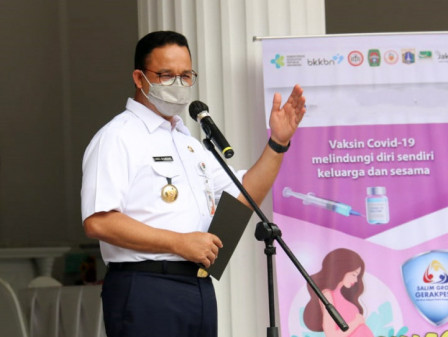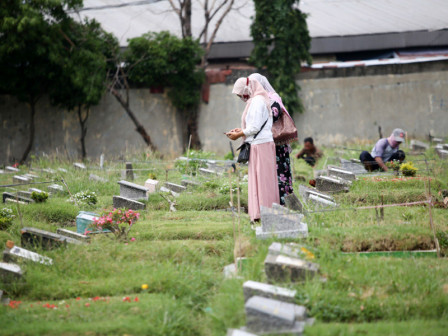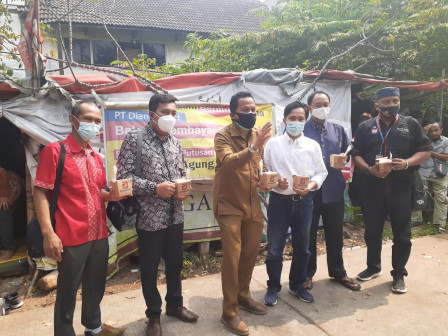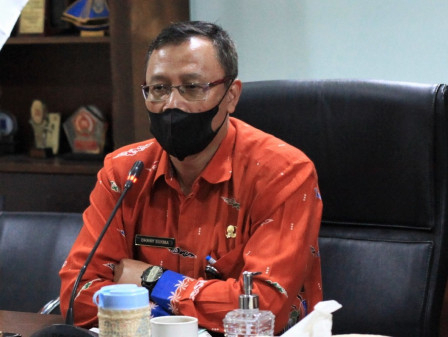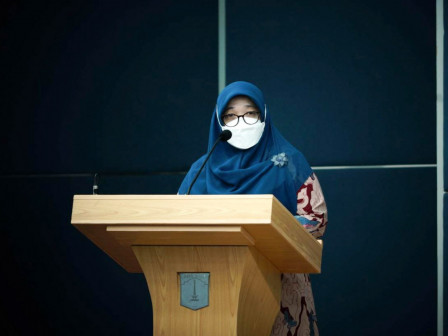PPKM Level 3 Extension, Follow Health Protocols for Better Condition
Reported by Yudha Peta Ogara | Translated by Nugroho Adibrata
Despite the cases are getting lower, we still have to be vigilant and must not ignore health protocols
The government has decided to extended the existing public activity restrictions (PPKM Level 3) until September 6. This policy is contained in Governor's Decree number 1055/2021 on PPKM Level 3, as well as Home Minister's Instruction number 38/2021 on PPKM Level 4, 3 and 2 in Java and Bali areas.
"Despite the cases are getting lower, we still have to be vigilant and must not ignore health protocols. We have to be patient and believe that Jakarta will get better with our joint efforts to take care of ourselves, such as vaccination, and discipline in obeying health protocols," expressed Jakarta Governor, Anies Baswedan, as quoted by Jakarta PPID's press release, Wednesday (9/1).
PPKM Level 3 in Jakarta, Anies Encourages People to Remain Disciplined in Implementing Health ProtocolsIn the Governor's Decree, it is stated that during PPKM Level 3, those who are active in each sector or place must have been vaccinated at least the first dose, except for people who are still within a grace period of 3 months after confirmed Covid-19 with evidence of laboratory results, and people who are contraindicated for Covid-19 vaccination based on the results of a medical examination with evidence of a doctor's certificate, and children aged less than 12.
For those of you who have been vaccinated, you can attach proof of your vaccinated status on JAKI application, a vaccination certificate issued by PeduliLindungi.id, and/or proof of vaccination issued by an authorized institution.
As for the information, the implementation of the Covid-19 health protocol and the enforcement of sanctions in this Governor's Decree is carried out in accordance with the provisions in Gubernatorial Regulation number 3/2021 on Implementing Regulations of Bylaw number 2/2020 on Covid-19 handling.
Below are the types of restrictions applied in the extension of PPKM Level 3:
1. Activities at work/office
- Non-essential sectors:
100% Work From Home (WFH)
- The essential sectors of finance and banking only include insurance, banks, pawnshops, pension funds, and financial institutions that are oriented to physical services with customers:
- a. 50% Work From Office (WFO) is for locations related to public services under stricter health protocols; and
b. 25% WFO is for office administration services to support operations under stricter health protocols
b. Capital market (which is oriented towards customer service and good capital market operations);
c. Information and communication technology includes cellular operators, data centers, internet, postal services, media related to the dissemination of information to the public; d. Hospitality non-quarantine handling; and - For letters (b) to (d) can operate with a maximum capacity of 50% staff and with stricter implementation of health protocols;
e. Export-oriented and supporting industries where the company must show proof of sample documents for Export Declaration of Goods (PEB) for the last 12 months or other documents showing export plans and are required to have an Operational Permit and Mobility of Industrial Activities (IOMKI) with due regard to technical arrangements from the Ministry of Industry. - For letter (e) can only operate with shift arrangements with a maximum capacity of 50% staff only in production facilities/factories, as well as 10% for office administration services to support operations, by implementing health protocols, using the PeduliLindungi application starting September 7, 2021, and the arrangements for entering and leaving and eating employees do not coincide. - Essential in the government sector that provides public services that cannot be delayed: 25% WFO is enforced with strict health protocols; - Critical sectors:
a. health;
b. security and order;
c. disaster management;
d. energy;
e. logistics, transportation, and distribution, especially for the basic needs of the community;
f. food and drink and their supporting equipment, including for livestock/pets;
g. fertilizers and petrochemicals;
h. cement and building materials;
i. national vital object,
j. national strategic projects;
k. construction (public infrastructure); and
l. basic utilities (electricity, water, and waste management):
1. For letters (a) and (b) 100% WFO can operate without exception and under stricter health protocols; and
2. For letters (c) to (l) can operate 100% WFO, only in production/construction facilities/services to the community and for office services to support operations, a maximum of 25% WFO is applied;
3. Companies that are included in the sector in letter (d), (e), (f), (g), (h), (k), (l) are required to use the PeduliLindungi application starting September 7, 2021 to screen for all employees and visitors who enter production/construction/service facilities and office administration areas; and
4. Companies that are included in the sector category according to letter (c) are required to obtain a recommendation from the technical ministry of sector guidance before they can gain access to use PeduliLindungi
2. Teaching and Learning Activities
- Education Units: Implementation of learning in education units can be done through limited face-to-face learning and/or distance learning based on the Joint Decree of the Minister of Education and Culture, Minister of Religion, Minister of Health and Minister of Home number 03/KB/2021, number 384/2021, number HK.01.08/MENKES/4242/2021, number 440-717/2021 on guidelines for the implementation of learning during Covid-19 pandemic and for Education units that implement face-to-face learning is limited to a maximum capacity of 50%, except for:
1. SDLB, MILB, SMPLB, SMLB, and MALB a maximum of 62% to 100% by maintaining a minimum distance of 1.5 meters and a maximum of 5 students per class; and
2. PAUD is a maximum of 33% by maintaining a minimum distance of 1.5 meters and a maximum of 5 students per class
3. Activities in the Daily Needs Sector
a. Supermarkets, traditional markets, people's markets, grocery stores, and supermarkets that sell daily necessities: Operational hours are limited to 9 PM with 50% visitor capacity, and under stricter health protocols, especially the main market can operate according to operational hour
b. Pharmacies and drug stores: Can be open 24 hours under stricter health protocols
c. People's markets that sell non-daily necessities: Can operate with a maximum capacity of 50%, and operating hours are limited to 5 PM under stricter health protocols
d. Street vendors, grocery stores, voucher agents/outlets, barbershops/barbershops, laundry, hawkers, small workshops, vehicle washes and others like: Allowed to open and operating hours until 9 PM under stricter health protocols
4. Eating/Drinking Activities in Public Places
a. Food stalls/warteg, street vendors, hawker stalls and the like: Allowed to open and operating hours until 9 PM with a maximum of 50% of visitors eating 50% of capacity and a maximum meal time of 30 minutes under stricter health protocols
b. Restaurants, cafes located in closed buildings/shops in separate locations: - Can accept dine-in with a maximum capacity of 25%, 1 table for a maximum of 2 people, and a maximum meal time of 30 minutes by following the health protocols that have been regulated by the Ministry of Trade, Ministry of Tourism and Creative Economy, and Ministry of Health. - Must use PeduliLindungi application to screen all visitors and employees; and - The list of companies that will participate in this trial is determined by the Ministry of Trade, and the Ministry of Tourism and Creative Economy
c. Restaurants, cafes with service areas in open spaces: Allowed to open and operating hours until 9 PM with a maximum capacity of 50%, 1 table for a maximum of 2 people, and a maximum meal time of 30 minutes under stricter health protocols
5. Activities at Shopping Centers/Malls/Trade Centers
a. Shopping center/mall/trade center: a. Allowed to operate at 50% and operating hours until 9 PM with due observance of the provisions in letters (3.a) and (4.b) and with the health protocol regulated by the Ministry of Trade;
b. Mandatory to use the PeduliLindungi application to screen all visitors and employees of related shopping centers/malls/trade centers;
c. Restaurants, cafes in shopping centers/malls/trade centers can accept dine-in with a maximum capacity of 50%, 1 table for a maximum of 2 people, and a maximum meal time of 30 minutes;
d. Residents under the age of 12 are prohibited from entering shopping centers/malls/trade centers; and
e. Cinemas, children's playgrounds and entertainment venues within shopping centers/malls/trade centers are closed
6. Construction Activities
- Construction sites for public infrastructure (construction sites and project sites):
Operating 100% with operating hours, capacity settings, under stricter health protocols
- Non-infrastructure construction sites for the public: Maximum 30 people allowed to operate by implementing stricter health protocols
7. Worship Activities
- Places of worship (mosques, prayer rooms, churches, temples, and pagodas and other places that function as places of worship): Can hold congregational worship/religious activities during PPKM Level 3 with a maximum of 50% capacity or 50 people by implementing stricter health protocols and paying attention to technical arrangements from the Ministry of Religion
8. Activities at Health Service Facilities
- Health care facilities: Operating 100%, under stricter health protocols
9. Activities in Public Areas and Other Places that trigger Crowds
- Public areas, public parks, public tourist attractions and other public areas: Temporarily closed
- Wedding Reception Venue: Can be held with a maximum of 20 invitations and do not hold meals on the spot by implementing stricter health protocols
- Locations for arts, culture, sports facilities, and social activities that can cause crowds: Temporarily closed
- Sports Facilities:
Especially for sports facilities in open spaces, they can operate with the following conditions:
1) Operational hours until 9 PM, without spectators under stricter health protocols;
2) Performed at the outdoor, either individually or in small groups of up to 4 people, does not involve physical contact with other people and does not routinely require individual interaction in close proximity, can be carried out under strict health protocols;
3) Outdoor sports facilities are permitted with 50% of the maximum capacity of people;
4) Masks must be worn during sports activities, except for sports activities that require removing the mask, such as swimming. For sports activities that require removing the mask, the mask can only be removed when carrying out sports activities;
5) Temperature checks are carried out on everyone who enters the sports facilities;
6) Restaurants and cafes within sports facilities are allowed to accept dine-in with a maximum capacity of 25% and a maximum meal time of 30 minutes;
7) Supporting facilities such as lockers, VIP rooms, and bathrooms are not permitted to be used except for toilet access;
8) Users of sports facilities are not allowed to gather before or after sports activities and must keep their distance;
9) Screening for visitors at sports facilities must use the PeduliLindung application; and
10) Sports facilities that violate health protocols will be subject to sanctions in the form of temporary closures
10. Activities on the Mode of Transportation
- Public Vehicles, Mass Transportation, Taxis (Conventional and Online) and Rental Vehicles: Maximum 50% passengers of capacity, under stricter health protocols
- Ojek (Online and Pool): Under stricter health protocols

